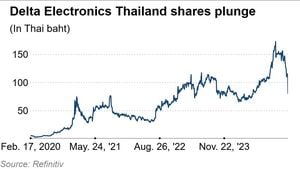On February 23, 2025, Germany held its eagerly anticipated federal election, which culminated in decisive results affecting the country's political future. With voter turnout reportedly at 84%, the highest since German reunification, the election saw significant shifts among the major political parties.
According to predictions by ARD, the CDU/CSU emerged as the leading party, garnering approximately 29% of the votes. This margin positions Friedrich Merz as the likely new Chancellor, representing the conservative coalition successfully over the past electoral period. The result was applauded by Merz, who thanked his party and its supporters, stating, "We the CDU and CSU, we have won this federal election!" He emphasized the importance of immediately taking action to govern effectively, saying, "The world out there does not wait for us,” indicating readiness to move forward swiftly on pressing international issues.
Despite the CDU/CSU's victory, the election results delivered sobering news for the SPD, whose leader Olaf Scholz admitted it was "a bitter election result for the Social Democratic Party". The SPD trailed with approximately 16% of votes, far behind the CDU/CSU. Scholz, visibly displeased with the rise of the AfD—a party garnering about 19.5%—expressed his disdain for their emergence, stating, "I will not and never will come to terms with it!" Scholz’s remarks reflect the increasing tension surrounding the rise of the right-wing AfD, igniting concerns over Germany's political direction.
The electoral performance of the FDP sparked intense reactions within the party, as they teetered on the edge of securing representation. With initial projections indicating around 4.9%, the FDP faced the possibility of failing to surpass the 5% threshold required for parliamentary seats. FDP leader Christian Lindner announced his withdrawal from leadership if the party did not secure enough votes, underscoring the internal pressure for significant change.
Recent updates indicated the potential for complicated coalition formations: any large coalition involving CDU/CSU and SPD hinges on the absence of the FDP and BSW from the Bundestag. This suggests the need for another party as coalition partners, which would significantly influence future government stability.
Another prominent outcome concerned the Left party, which gained enough traction to enter parliament with around 8.5% of the votes, marking their return to relevance within the German political tableau. Meanwhile, the Greens experienced reduced support, falling to approximately 13.5% of the votes. This decline raises questions about their impact and role as political partners.
The Bundeswahlleiterin (Federal Returning Officer) reported unprecedented levels of participation, indicating strong public engagement compared to the previous federal election, where turnout was only 76.4%. This increase highlights the importance placed on this election by German voters amid rising political tensions and issues at home and abroad.
Friedrich Merz, capitalizing on the CDU/CSU’s lead, promised speedy government formation by Easter 2025, prompting quick discussions with Olaf Scholz for transition work. His aspirational timeline aims to secure governmental authority swiftly, indicating urgency amid looming political changes.
The 2025 election marked the first application of the revised electoral framework, significantly impacting voter dynamics. With adjustments eliminating overhang and compensatory mandates, the importance of the second vote has surged, emphasizing strategic voting patterns. Such changes may incentivize voters to think critically about their party allegiances moving forward.
Throughout the election day, reports of increased voter activity flowed from multiple regions, including regional strongholds like Bremen and Berlin. Voters were particularly mobilized, reflecting the civic sentiment and the ambience of political obligation ingrained within the fabric of the electorate. The Federal President, Frank-Walter Steinmeier, lauded the efforts of volunteers across the nation responsible for overseeing the electoral process.
Post-election analysis not only emphasizes the CDU/CSU’s returning strength but also highlights the turbulent territory on which they will have to navigate for future governance. The presence of the AfD and the uncertainty surrounding the FDP’s performance will inherently shape the coalition talks, defining the relationships among Germany's political parties.
With the final results to be confirmed later at night, the early projections set the stage for what could become one of the most pivotal moments in German politics. Maintaining effective governance and attending to the pressing issues facing the nation will undoubtedly focus the new administration's initial actions as they tackle the dynamic political climate.



